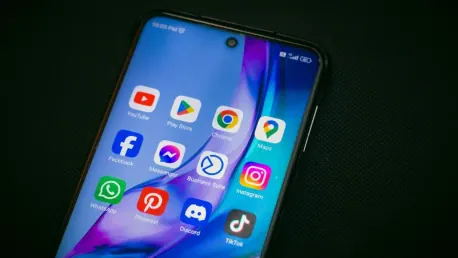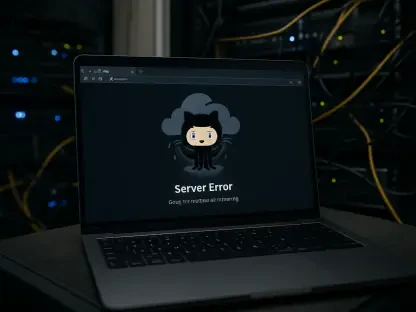The use of Virtual Private Networks (VPNs) aims to enhance online privacy and security by encrypting internet traffic and masking users’ identities. Nevertheless, not all VPNs perform equally, particularly free Android VPNs, which often pose significant risks. Users seek these free options in hopes of protecting their online activities without incurring extra costs, yet they may inadvertently expose themselves to greater threats.
Investigating Free Android VPN Vulnerabilities
The increasing reliance on free Android VPNs has led to many users overlooking the inherent security and privacy flaws that come with them. A recent report by Top10VPN uncovers several vulnerabilities present in free Android VPN apps, including the leakage of IP addresses and WebRTC data, compromising users’ anonymity. By exposing such sensitive information, these VPNs fail to provide the core function that users seek—protection against tracking and data breaches.
Growing Concerns
The report sheds light on the fact that many free VPNs expose user data due to deficient security infrastructures. In particular, the leakage of IP addresses can directly negate the purpose of utilizing a VPN, placing users at risk of being tracked or targeted by malicious entities. WebRTC data leaks further amplify these concerns, as this vulnerability allows websites to discover users’ real IP addresses even when connected through a VPN. These consistent leaks demonstrate major security loopholes within the architecture of many free VPN applications, thereby undermining their credibility and reliability in safeguarding user information.
Encryption Shortcomings
Moreover, the report highlights that many free VPNs fail to provide adequate encryption systems or, in some cases, provide no encryption at all, exposing users’ HTTP data to potential cyberattacks. Without strong encryption protocols, user data sent over these VPNs can be easily intercepted by hackers, increasing the risk of information theft and unauthorized access. The lack of proper encryption means that any data transmitted over these networks, including personal information, passwords, and financial details, could be vulnerable to cyber-attacks. This glaring inadequacy in encryption exposes users to far more risks than benefits, raising questions about the overall efficacy of such free VPN services in providing meaningful online security.
Popularity Versus Performance
Despite the notable concerns regarding their security, free Android VPNs have garnered widespread popularity, largely due to their no-cost appeal. Yet, the performance and safety of these apps lag significantly behind their paid counterparts. The sheer abundance of these VPNs in the market raises questions about the correlation between their popularity and actual performance.
Download Statistics
Astonishingly, free VPNs have amassed over 2.5 billion installs worldwide, showcasing their popularity among users seeking cost-free privacy solutions. However, the report finds that many of them fail to offer robust security measures, and only a small fraction uses strong encryption algorithms. This discrepancy signifies that the vast number of users relying on these services may not be receiving the protection they anticipate. Noteworthy is that over 10% of these apps do not encrypt data adequately, while more than half exhibit VPN tunnel instability, and only 20% utilize robust encryption hashing algorithms. The report’s findings unearth a critical flaw in the way users evaluate and trust free VPN services based solely on their availability and download numbers.
Specific Risks
Particular apps, such as Turbo VPN, VPN Proxy Master – Safer VPN, and VPN Monster – Secure VPN Proxy, were cited for IP and DNS leaks as well as encryption issues, showcasing the widespread nature of the problem. These security breaches are indicative of systemic flaws that do not get addressed due to the lack of stringent oversight and regulation in the development and distribution of free VPN apps. The presence of such severe vulnerabilities across multiple popular apps underscores the pressing need for users to re-evaluate their choices. The report clarifies that relying on these services can substantially compromise user data, leaving individuals more susceptible to cyber threats than if they had not used a VPN at all.
Privacy Concerns with ByteDance Association
A further layer of apprehension arises when considering the associations of certain VPN apps with larger, often controversial entities. The integrity and privacy standards of these apps are questioned, particularly when their parent companies have faced scrutiny over their data handling practices.
ByteDance’s Involvement
Notably, fifteen of the VPN apps studied contain code from ByteDance, the parent company of TikTok, raising privacy concerns due to the company’s controversial data practices. The intertwining of ByteDance’s code within these apps triggers alarms because of the company’s history of alleged data misuse and surveillance, raising red flags about the potential for user data to be harvested. The inclusion of ByteDance’s code indicates a higher risk for non-transparent data practices, which could further erode user privacy and security.
Regulatory Actions
US regulators have classified ByteDance as a national security risk, and the company has faced bans, accentuating the need for caution when using these associated VPNs. Such regulatory actions shed light on the underlying risks posed by using VPNs tied to companies flagged for national security concerns. The legislative steps to ban ByteDance reflect the seriousness of potential privacy breaches, urging users to be particularly wary of VPNs connected with contentious firms. The convergence of VPN usage with geopolitical tensions highlights the intricate dynamics between technology, privacy, and national security, underscoring the necessity for users to stay vigilant and informed about the VPN services they employ.
Malware and Malicious Connections
In addition to the explicit data vulnerabilities, several free Android VPNs pose indirect threats through their connections and embedded malicious software. The potential for these apps to serve as conduits for malware can drastically undermine device security, leading to severe repercussions for unsuspecting users.
Antivirus Warnings
The report flags 20% of the examined VPN apps for containing Trojan malware or phishing tools, with antivirus software sometimes highlighting false positives yet reminding users of the continued risks. The presence of malware within these apps signifies a dual threat; users are not only unprotected from online threats but are also exposed to device-level risks. Even though some of these warnings could be false positives, their frequency is alarming and merits caution. The infiltration of Trojan malware can have devastating effects, such as data corruption, unauthorized data access, and even full device compromise. The dual risk of unsecured internet connections coupled with direct malware threats amplifies the critical need for meticulous scrutiny before choosing a VPN service.
Malicious IP Connections
Additionally, numerous VPN apps were found to connect to IP addresses flagged as malicious, indicating further potential dangers for users relying on these services. Connecting to such high-risk IP addresses not only jeopardizes the immediate security of user data but may also leave users prone to targeted cyber-attacks. The interconnected network of malicious IP connections can serve as entry points for various cyber threats, further breaching user trust. These unsettling connections suggest that free VPNs may be indirectly complicit in broader cybercrime activities, emphasizing the importance of thorough research and cautious service selection.
Recommendations for Secure VPN Usage
Given the pervasive risks associated with many free Android VPNs, it is imperative to take measured steps to ensure online privacy and security. Notably, a few free VPNs demonstrate resilience against known vulnerabilities, and users should be aware of these exceptions alongside generalized cautions.
Reliable VPN Options
While the report details the risks of free VPNs, it also identifies some resilient options like Atlas VPN and BitDefender VPN, which do not exhibit IP and DNS leaks. These VPNs stand out due to their commitment to strong encryption practices and robust security measures, providing users with more reliable protection. They set a benchmark for what to look for in a VPN service—transparency, proven encryption techniques, and a track record of safeguarding user privacy. Investing in a reputable VPN ensures that users benefit from stable, high-performance connections and comprehensive security measures designed to prevent data breaches and unauthorized access.
Emphasizing User Awareness
VPNs are designed to improve online privacy and security by encrypting internet traffic and hiding users’ identities. However, the performance and security of VPNs can vary widely, particularly when it comes to free Android VPNs. These free options are appealing to many users who want to protect their online activities without paying additional fees, but they can often end up being more harmful than helpful. Many free VPNs may fail to offer adequate security, leaving users vulnerable to cyber threats. Furthermore, some even collect and sell user data, defeating the very purpose of using a VPN for privacy. This is a worrisome issue for users who believe they are safeguarding their information when, ironically, they might be compromising it more. While the promise of cost-free protection is tempting, the reality is that using a reliable, paid VPN service is generally much safer and more effective. Investing in a trustworthy VPN not only ensures better security and privacy but also delivers more robust performance, giving users peace of mind while navigating the internet.









